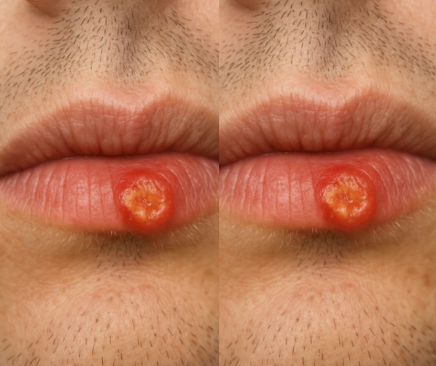
Why a Non-Healing Lip Sore Shouldn’t Be Ignored
Dealing with a sore on your lip that refuses to heal is more than just annoying—it can be worrying. While most minor cuts or irritations on the lips fade in a week or two, a sore that lingers beyond that is a sign your body might be trying to tell you something. And with doctor appointments harder to book these days, it’s worth knowing what could be going on and what you can do while waiting to see a specialist.
Understanding Persistent Lip Sores
A persistent lip sore is one that doesn’t heal within about two weeks. Lips are delicate and exposed, so they’re highly vulnerable to irritation, infection, and even environmental stress. These sores may appear red, crusty, or scaly, and they can be painful, itchy, or even numb. Tracking how they look and feel over time gives important clues to the cause.
Cold Sores and Viral Infections
One of the most common reasons for stubborn lip sores is the herpes simplex virus (HSV), often showing up as cold sores. They start as small, painful blisters that burst and scab over. Stress, illness, and too much sun can trigger outbreaks. Normally, cold sores clear in two to four weeks, but if they keep recurring or hang around, antiviral creams or prescription medications may be needed to keep them under control.
Allergic Reactions and Everyday Irritants
Not all lip sores are viral. Sometimes your lip balm, toothpaste, or even food could be the culprit. Allergic reactions or contact dermatitis can make lips inflamed and sore. If you’ve recently changed a product and noticed symptoms, try cutting it out. Switching to fragrance-free or hypoallergenic options can make a big difference in healing time.
Bacterial Infections That Delay Healing
Bacterial conditions, like impetigo, can cause red sores that crust over in yellowish patches. These infections spread easily, especially if you touch or pick at the sore. Over-the-counter ointments may help mild cases, but more serious ones require antibiotics. Keeping lips clean, avoiding touching, and practicing good hygiene can reduce the risk.
Video : Dermatologist explains causes of cold sores
Could It Be Skin Cancer?
This one sounds scary, but it’s important to mention. A lip sore that looks scaly, thickened, or grows steadily might be a sign of squamous cell carcinoma, a type of skin cancer. Risk factors include sun exposure, smoking, and a history of precancerous conditions. If a sore doesn’t heal or seems to be worsening, a biopsy from a dermatologist is often the next step.
Autoimmune Disorders and Lip Sores
Sometimes, the issue runs deeper. Autoimmune conditions like lupus or pemphigus vulgaris can cause long-lasting sores on the lips and other parts of the body. These occur when the immune system mistakenly attacks healthy tissues. Diagnosis usually requires blood work and medical evaluation, but knowing it could be a possibility helps push for proper testing.
Nutritional Deficiencies You Might Overlook
A lack of essential vitamins, particularly B2, B3, and B12, can lead to cracked, crusty sores—especially at the corners of the mouth. Known as angular cheilitis, this condition can be painful but often improves with better nutrition. A diet rich in leafy greens, whole grains, and lean proteins or the right supplements can help restore balance.
Home Remedies Worth Trying
While waiting for an appointment, simple natural remedies can bring relief:
- Aloe vera gel: soothes inflammation and keeps lips moisturized.
- Honey: has natural antibacterial properties and helps speed up healing.
- Coconut oil: locks in moisture and reduces irritation.
- Cold compresses: minimize swelling and discomfort.
These remedies aren’t cures, but they can make the sore less painful and help it heal faster.
Over-the-Counter Solutions
Pharmacies offer several products that may help, depending on the cause:
- Antiviral creams like docosanol can shorten cold sore outbreaks.
- Antibacterial ointments help with minor cuts or bacterial infections.
- Hydrating balms prevent dryness and reduce irritation.
Always follow directions carefully, and if symptoms don’t improve, don’t keep reapplying endlessly—seek medical input.
When to See a Doctor
If a lip sore sticks around beyond two weeks, gets larger, bleeds, or causes ongoing pain, professional help is non-negotiable. Even if appointments are hard to secure, options like telemedicine or urgent care clinics can get you faster answers. Catching the issue early means better treatment and fewer complications.
Video : Canker Sores Vs Cold Sores – Dr. Berg on Mouth Sores
Conclusion: Taking Control of Your Lip Health
A persistent sore on your lip can feel small, but it might signal something bigger. From viral infections and allergies to nutritional gaps and, in rare cases, cancer, the possibilities are wide. While home care and over-the-counter treatments can help manage symptoms, don’t ignore a sore that doesn’t heal. Pay attention to your body, use simple remedies to stay comfortable, and push for medical evaluation when needed. Your lips aren’t just for smiles—they’re an important part of your overall health


